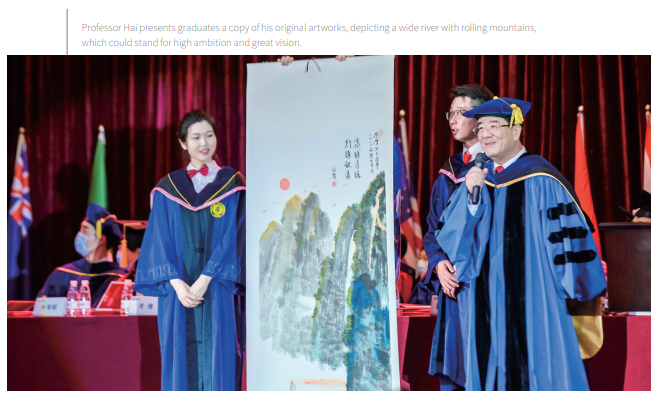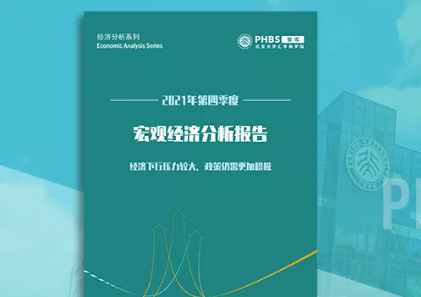Speak slowly and act fast. Professor Hai Wen has the great wisdom of an economist. After nine years in the Great Northern Wilderness, Hai Wen took the college entrance examination in 1977. Later, he became one of the first students studying abroad after China's Reform and Opening-up. As one of the generation of returned economists, Hai Wen has the quality of independence and tenacity shaped by his times.
Education renders him an international horizon and ignites his enthusiasm to open schools. He established the China Center for Economic Research in 1994 and the Peking University HSBC Business School (PHBS) in 2004. He worked with leading entrepreneurs from all walks of life to set up the Rural Development Research Institute in 2019. It has been more than two decades since he embarked on the journey of entrepreneurship. His outlook is to help educate the Chinese with an international vision and cutting-edge knowledge of economics. He hopes that every student and every teacher will become an important part of China's take off. The sense of mission stems from his early years’ experience.
The way to economics
In 1969, Hai Wen left Hangzhou city for the countryside in Hulin County, Heilongjiang Province, and stayed in the Great Northern Wilderness for the next nine years. What was our slogan back then? It was “going to the countryside, to the frontier, to where the motherland needs us most” . I took the lead to sign up to join the county production team in Heilongjiang Province to help build and defend the frontier, and cultivate and garrison the border. I was ambitious and very proud of myself at that time. Reaping wheat is hard work, but cutting soybeans is worse.
At the turn of autumn and winter, the soybean straw is dry and sharp and it hurts when you grasp it. Generally, reapers need gloves to protect their hands, but a pair of gloves costs one yuan. Those who can't afford it have natural gloves — their own skin. After a day's work, their hands will be blooded and scarred. Tough work in the countryside has hardened Hai Wen. In 1977, he attended the college entrance examination with the other 5.7 million candidates and was admitted to Peking University, where his inextricable connection with economics started.
After graduating, he earned a masters degree ’ and doctorate in economics from the University of California, Davis. His goal of studying overseas was very clear — go to the United States to learn economics and return to participate in the economic construction of the motherland. “On the one hand, I was attracted by western economics, with a strong desire to study the western academic system, hoping to have a deeper understanding of western society. On the other hand, it was my dream to support China's rejuvenation by exploring why the American economy was developed and by borrowing from its experience to build a better China.”
In 1994, Hai Wen joined a group of young returned economists including Lin Yifu, Yi Gang, and Zhang Weiying to found the China Center for Economic Research (CCER) at Peking University, now the National School of Development (NSD). It is regarded as an important national think tank and an academy for high-end talents in economics. In 1995, after studying and working overseas for 13 years, Hai Wen returned to Peking University and devoted himself to teaching, research, and management. Since then, he has embarked on the road of economic research, renowned as one of the most important figures influencing China's economic development.
A great teacher
When PHBS was established in 2004, there was only one building available. The resources of teachers, students, and funds, were almost non-existent. "We can start building renovation with a start-up fund of one million yuan," Hai Wen told the president of Peking University. "A Department of Science and Technology laboratory will cost one million yuan, the president responded in surprise, “How can we run a college?" It turned out that Hai Wen had spent less than one million in purchasing some computers for the staff, and on renovation. From here,business school took shape."You have to learn how to raise funds yourself to run a business school.
In 2008, I convinced HSBC to donate 150 million yuan, before convincing the government to match fund. After new buildings were constructed, our campus was expanded." Since the erection of a brand new teaching building in 2013, the Peking University HSBC Business School has grown to be an international economic academy that, each year, has trained nearly 600 masters and doctoral students from around the world in economics, management, finance, and financial media.
In the teaching building, there is a brick donation wall, which denotes the contribution from all sides of the society. On the first brick is engraved the name "Hai Wen". Around his are more bricks, building a grander wall, and representing donations from alumni, entrepreneurs, and friends from all walks of life. Alumni's donations go directly to the Peking University Education Foundation, which is used to sponsor teachers, award scholarships to students, and support the launch of innovative teaching and research programs. "The essence of education means that one tree shakes another tree, one cloud pushes another cloud, and one soul awakens another soul," as the German philosopher Karl Jaspers said.
Hai Wen agrees with Jaspers. In his view, what matters most is not money, but the culture of donation. When students don't have the money, they are offered fellowships and scholarships. When they succeed upon leaving school, they can give back and help younger generations. It’s the heritage of the donor spirit. PHBS has adhered to the donor's spirit and is sowing the seeds of hope, by establishing high-end research institutions, namely, the Sargent Institute of Quantitative Economics and Finance, the China Center for Macroeconomic Research (CCMR), and the Research Institute of the Maritime Silk-Road (RIMS), launching PHBS’ s UK Campus, and obtaining a series of international accreditations such as AACSB, EFMD and AMBA.

In addition, the school has set up the Centre for Innovation and Entrepreneurship and launched the cooperative degree program with the University of Cambridge Judge Business School. Further achievements include building academic exchange platforms, fruitful partnerships with other schools and universities, and promoting the internationalization of higher education in Shenzhen. During more than a decade since startup, Hai Wen has tutored hundreds of masters and doctoral students. Most are working in Shenzhen, and hundreds have settled in Beijing, Shanghai and other parts of China.
In Shenzhen, The essence of rural development is to study how farmers keep up with the pace of economic development during industrialization and urbanization, and how to ensure their income. Agricultural income alone is insufficient, so we need agricultural modernization to create more opportunities to generate non-agricultural income.In the past, there were a lot of labor-intensive industries in Shenzhen, which were undergoing progressive transformation. The school’s MBA, EMBA, and EDP training courses have played an important part in this regard.
In September 2019, Hai Wen worked with reputable entrepreneurs such as Wang Shi, the founder of the Vanke Group, and Feng Lun, the founder of the Wontop Group, to launch the Rural Development Research Institute at Yan'an University. Hai was appointed as the Founding Director. During the next five years, Hai Wen undertook his new mission of rural development. One of the most important changes in the transformation from a developing to a developed country is that the proportion of farmers will drop greatly. In a developed country, farmers account for no more than 5% of the population. For example, the agriculture in America is well developed, but farmers make up only 1% of the population. China is now making that transition

"The essence of rural development is to study how farmers keep up with the pace of economic development during industrialization and urbanization, and how to ensure their income. Agricultural income alone is insufficient, so we need agricultural modernization to create more opportunities to generate non-agricultural income, Hai Wen explained.
Hai Wen revealed that the Rural Development Research Institute will enroll full-time graduate students and set up rural development-related majors, focusing on training highly competent and well-rounded talents to serve the strategy of rural revitalization. In conjunction with PHBS, the Institute will invite prominent experts, entrepreneurs, and policy makers from inside and outside of China, to give on-the-job training in innovation, entrepreneurship, and management within the Northwestern rural areas. The goal is to broaden the horizons and enhance the innovation and management capabilities of farmer entrepreneurs, and to coach and foster new rural enterprises. Business schools focus on the promotion of economic development and a very important part of rural development is the reliance on its economy.
PHBS and the Rural Development Research Institute share a common mission in terms of the study of economic development, policy, and talent training. "People in my generation emphasize an enduring ideal, which is also the culture and mission of Peking University: One's work should benefit country and society," Hai Wen said, adding that both institutions are making great efforts to create a better society. Hai Wen has been working on the front line, preoccupied with the business of recruitment, administration, and various innovative projects, but when doing what he loves, his mind is happy even if his body is weary. “Except for primary education in the early years, degree education for adults and further education after work, education itself is a continuous process. The scope of teaching is not limited to students pursuing degrees in schools.” Hai Wen explained the meaning of education," Students learn what they think is useful from the teacher. Upon achieving great success after graduation, their teacher will be very pleased and proud.”
Excerpt from iAsk Public Welfare Leader
















